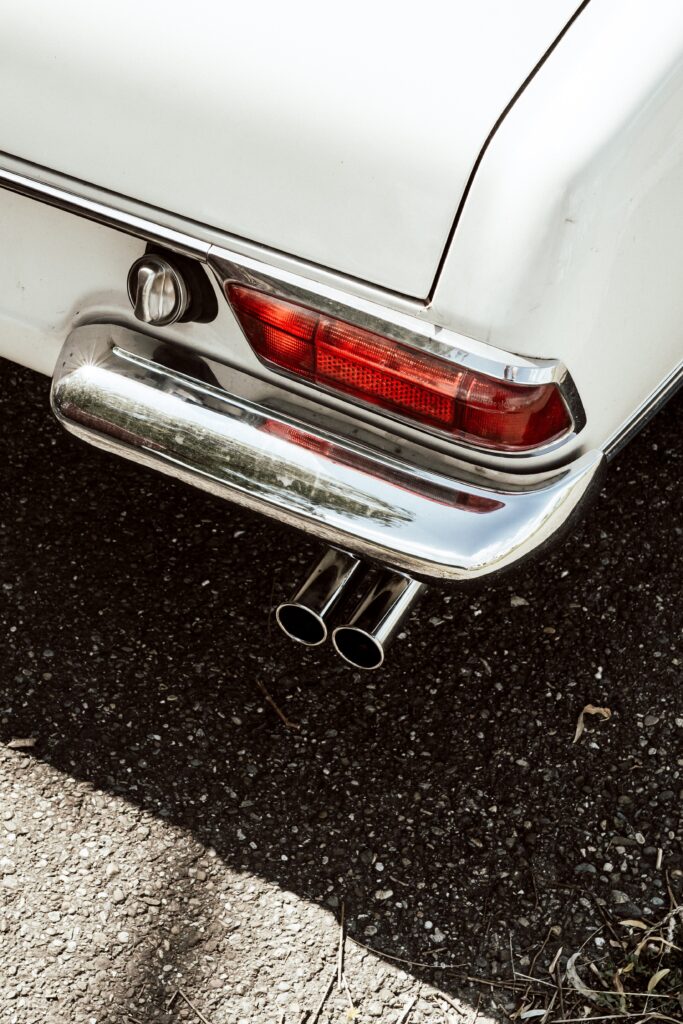Imagine you’re driving down the road, enjoying the smooth ride of your car, when suddenly, you start hearing strange noises coming from under the hood. You can’t help but wonder, could this be related to your transmission? Surprisingly, the answer might lie in an unexpected place – your exhaust system. Yes, you read that right. A bad exhaust system has the potential to wreak havoc on your transmission, and in this article, we’ll explore exactly how this unlikely connection can impact your driving experience. So strap in, and let’s dig into the surprising relationship between your exhaust system and transmission.
Understanding the Role of an Exhaust System
The Basic Functionality of an Exhaust System
When it comes to the overall performance and functioning of a car, the exhaust system plays a crucial role. The primary function of an exhaust system is to safely remove harmful gases produced by the engine and direct them away from the vehicle. It acts as a pathway for the gases to exit the engine and ensures that the engine operates efficiently.
Components of an Exhaust System
An exhaust system is composed of several components, each serving a specific purpose. The main components include the exhaust manifold, catalytic converter, muffler, resonator, and tailpipe. The exhaust manifold collects the gases from the engine’s cylinders and delivers them to the next component in line, which is the catalytic converter. The catalytic converter helps to reduce emissions by converting harmful gases into less harmful ones. The muffler and resonator work together to reduce noise levels produced by the exhaust gases before they exit through the tailpipe.
How an Exhaust System Works
The exhaust system operates on a simple principle: it uses a series of pipes and components to guide the gases produced during the combustion process out of the engine. As the engine runs, the exhaust manifold collects the hot gases produced by each cylinder. These gases then flow through the catalytic converter, where they are converted into less harmful substances. The muffler and resonator help to reduce noise levels by disrupting the flow of gases and allowing them to expand before exiting through the tailpipe.
Importance of a Well-functioning Exhaust System
A well-functioning exhaust system is crucial for multiple reasons. Firstly, it ensures the optimal performance and efficiency of the engine by effectively removing gases and maintaining the correct backpressure. This, in turn, leads to improved fuel efficiency and engine power. Secondly, a healthy exhaust system helps to reduce harmful emissions, making the vehicle more eco-friendly. Lastly, a properly functioning exhaust system minimizes noise levels, providing a comfortable driving experience for both the driver and passengers.
Understanding Car Transmission and Its Function
The Role of Transmission in a Car
The transmission system of a car is responsible for transferring power from the engine to the wheels. It plays a vital role in determining the speed and torque of the vehicle. The transmission system allows the car to shift gears smoothly, enabling the driver to accelerate or decelerate as needed. It is an essential component that ensures the efficient and controlled transfer of power from the engine to the wheels.
Types of Car Transmissions
There are two main types of car transmissions: manual and automatic. Manual transmissions require the driver to manually shift gears using a clutch pedal and a gear shifter. On the other hand, automatic transmissions do not require manual gear shifting and instead automatically change gears based on the vehicle’s speed and conditions. Each transmission type has its own pros and cons, and the choice often depends on the driver’s preferences and driving style.
Signs of a Healthy Transmission System
A healthy transmission system exhibits certain characteristics that can help determine its condition. Smooth gear shifts, without any noticeable jerking or hesitation, indicate a well-functioning transmission. Additionally, the absence of any unusual noises, such as grinding or whining, is a positive sign. Proper acceleration and responsiveness, along with the ability to maintain speed without any issues, are also indicators of a healthy transmission system.
Understanding Transmission Fluid
Transmission fluid is a crucial component of the transmission system. It serves multiple purposes, including lubricating the moving parts, reducing friction, and dispersing heat. The fluid also aids in the transmission’s cooling process and helps to maintain the system’s hydraulic pressure. Regularly checking and replacing the transmission fluid is essential to ensure proper functioning of the transmission and prevent potential issues in the long run.

Identifying Problems With Your Exhaust System
Common Signs of a Bad Exhaust System
Recognizing the signs of a bad exhaust system is essential to address any potential issues promptly. Some common signs include loud and unusual noises, such as hissing or rattling sounds, coming from the exhaust system. Visible smoke or fumes coming from the tailpipe, especially if they are black or excessively white, can also indicate a problem. Additionally, a decrease in fuel efficiency and a noticeable decrease in engine power are other signs to look out for.
Potential Causes of Exhaust System Damages
There are several factors that can contribute to the damage of an exhaust system. Corrosion is one of the most common causes, as exposure to moisture, salt, and other environmental elements can lead to rust and deterioration of the exhaust components. Physical damage from road debris or accidents can also result in exhaust system problems. Engine issues, such as misfires or an overly rich fuel mixture, can cause excessive heat and put strain on the exhaust system, leading to damages.
Mechanical Issues vs. Other Factors affecting Exhaust System
It is important to differentiate between mechanical issues and other factors that can affect the exhaust system. Mechanical issues refer to problems directly related to the components of the exhaust system. This includes damage to the exhaust manifold, catalytic converter, muffler, or other parts. Other factors, such as improper installation, poor quality parts, or driving habits, can also impact the overall performance and lifespan of the exhaust system, but they may not necessarily be considered mechanical issues.
Recognizing Transmission Problems
Common Symptoms of Transmission Issues
Recognizing the symptoms of transmission problems can help prevent further damage and costly repairs. Some common signs include difficulty shifting gears, such as grinding or slipping when changing gears. Delayed engagement or a noticeable delay in response when accelerating can also indicate transmission issues. Unusual noises, such as clunking or humming, coming from the transmission are other warning signs. Any of these symptoms should prompt a visit to a qualified mechanic for further inspection.
Causes of Transmission Problems
Transmission problems can have various causes, ranging from mechanical issues to external factors. Mechanical issues can include worn-out gears or clutch plates, damaged solenoids, or a faulty torque converter. Lack of proper maintenance, such as infrequent fluid changes or inadequate cooling, can also contribute to transmission problems. Additionally, external factors like driving habits, such as aggressive or frequent towing, or excessive heat exposure can accelerate the wear and tear of the transmission.
Transmission Leaks and Failures
Leaks are a common issue that can affect the transmission system. Transmission fluid leaks can occur due to worn-out seals or gaskets, loose connections, or cracks in the transmission housing. These leaks can lead to a drop in fluid levels, which can cause overheating and ultimately result in transmission failures. A transmission failure can occur due to multiple factors, including insufficient fluid levels, excessive wear on internal components, or electrical malfunctions.
Cost to Repair Transmission Issues
The cost of repairing transmission issues can vary depending on the extent of the problem and the type of transmission system in the vehicle. Minor repairs, such as replacing worn-out clutch plates or solenoids, can be relatively inexpensive. However, major repairs or complete transmission replacements can be quite costly. It is crucial to address transmission problems promptly to avoid further damage and potentially minimize repair costs.

How a Bad Exhaust System May Impact Car Transmission
The Mechanics behind Exhaust System Affecting Transmission
While the exhaust system and transmission are separate components in a car, there is a mechanical connection between the two. The exhaust system relies on the proper functioning of the engine, which, in turn, affects the overall performance of the transmission. Any issues with the exhaust system, such as blockages or leaks, can indirectly affect the engine’s performance and, subsequently, impact the transmission’s ability to transfer power efficiently.
Evidence Supporting the Impact
There is evidence to support the impact of a bad exhaust system on car transmission. For example, a blocked or restricted exhaust system can result in increased backpressure within the engine. This can lead to decreased engine efficiency, reduced power output, and an increase in engine temperature. These factors, in turn, can put strain on the transmission system, affecting its ability to shift gears smoothly and transfer power effectively.
Dispelling Myths of Exhaust System Affecting Transmission
Despite the evidence, there are some myths surrounding the impact of an exhaust system on the transmission. One prevailing myth suggests that a bad exhaust system can cause the transmission to fail completely. While an inefficient exhaust system can contribute to transmission issues, it is not the sole factor responsible for a complete transmission failure. It is essential to consider other factors, such as regular maintenance, driving habits, and overall vehicle condition, when assessing potential transmission problems.
Consequences of Ignoring a Damaged Exhaust System
Immediate Consequences for your vehicle
Ignoring a damaged exhaust system can have immediate consequences for your vehicle. Excessive noise from the exhaust system can not only be annoying but also result in potential legal issues, as many jurisdictions have noise regulations in place. A damaged exhaust system can also cause decreased fuel efficiency, leading to higher fuel consumption and increased costs. Furthermore, engine performance may suffer, resulting in reduced power and acceleration.
Long Term Consequences for Your Vehicle
The long-term consequences of neglecting a damaged exhaust system can be more severe. The increased strain on the engine due to poor exhaust system performance can lead to premature wear of engine components. This can result in expensive repairs or even the need for a complete engine replacement. Additionally, a damaged exhaust system may allow harmful gases to escape into the environment, contributing to air pollution and potential regulatory violations.
Safety Risks and Environmental Impact Caused by a Damaged Exhaust System
A damaged exhaust system poses safety risks and has a negative environmental impact. If the exhaust system is leaking or damaged, harmful gases can enter the passenger cabin, exposing the occupants to carbon monoxide and other toxic substances. Carbon monoxide is odorless and can cause drowsiness, dizziness, or even death in high concentrations. Furthermore, a damaged exhaust system can contribute to air pollution by releasing excessive emissions into the atmosphere, which can harm both human health and the environment.

Potential Benefits of a Well Maintained Exhaust System
Increasing Vehicle Efficiency
A well-maintained exhaust system can significantly increase vehicle efficiency. By ensuring proper airflow and minimizing restrictions, the exhaust system allows the engine to operate at its optimal level. This leads to improved fuel efficiency and overall better performance. Additionally, a well-maintained exhaust system promotes the longevity of the engine and other vital components, reducing the need for premature repairs or replacements.
Preventing Damage to Other Car Parts
A properly functioning exhaust system can prevent damage to other car parts. For instance, a damaged exhaust manifold can allow hot exhaust gases to escape, potentially causing heat damage to nearby components or wiring. Additionally, a malfunctioning catalytic converter may lead to engine misfires or poor fuel combustion, putting strain on other engine components. By ensuring the exhaust system is in good condition, the risk of collateral damage to other parts of the vehicle is minimized.
Reducing Environmental Impact
A well-maintained exhaust system contributes to reducing the environmental impact of a vehicle. By effectively filtering and converting harmful gases, such as carbon monoxide and nitrogen oxides, into less harmful substances, the exhaust system plays a vital role in reducing air pollution. This is particularly important considering the growing concerns about climate change and the need to minimize harmful emissions.
Cost of Neglecting Proper Maintenance of Exhaust and Transmission Systems
Financial Implication of Ignored Maintenance
Neglecting the proper maintenance of the exhaust and transmission systems can come with financial implications. The cost of repairs or replacements due to persistent neglect can be significantly higher than regular maintenance expenses. For example, the repair costs of a damaged transmission resulting from inadequate maintenance can be substantial, potentially requiring a complete transmission replacement. By investing in regular maintenance, the chances of encountering costly repairs or replacements can be minimized.
Breakdown of Repair Costs for Exhaust and Transmission Systems
The repair costs for exhaust and transmission systems can vary depending on the extent of the damage and the specific components involved. For the exhaust system, repairs may range from replacing a damaged muffler or resonator to a complete exhaust system replacement. The costs can range from a few hundred dollars to over a thousand dollars, depending on the complexity and extent of the repairs. Transmission repairs can be even more costly, with complete replacements potentially exceeding several thousand dollars.
Cost of Replacement vs. Repair
When considering whether to repair or replace a damaged exhaust or transmission system, cost plays a significant role. In general, minor repairs are often more cost-effective than complete replacements. However, it is essential to consider the overall condition of the system, the likelihood of future issues, and the overall value of the vehicle. In some cases, investing in a replacement may be a wiser long-term financial decision if the existing system is outdated or prone to further problems.
In conclusion, understanding the role of an exhaust system and the function of car transmission is essential for maintaining a well-functioning vehicle. Recognizing problems with these systems, addressing them promptly, and giving proper attention to their maintenance can minimize the risk of expensive repairs and ensure a safe and efficient driving experience. Moreover, a healthy exhaust system and transmission contribute to vehicle efficiency, prevent damage to other parts, and reduce environmental impact. By prioritizing the care of these systems, you can enjoy a smooth and reliable ride while minimizing the financial burden of neglected maintenance.
